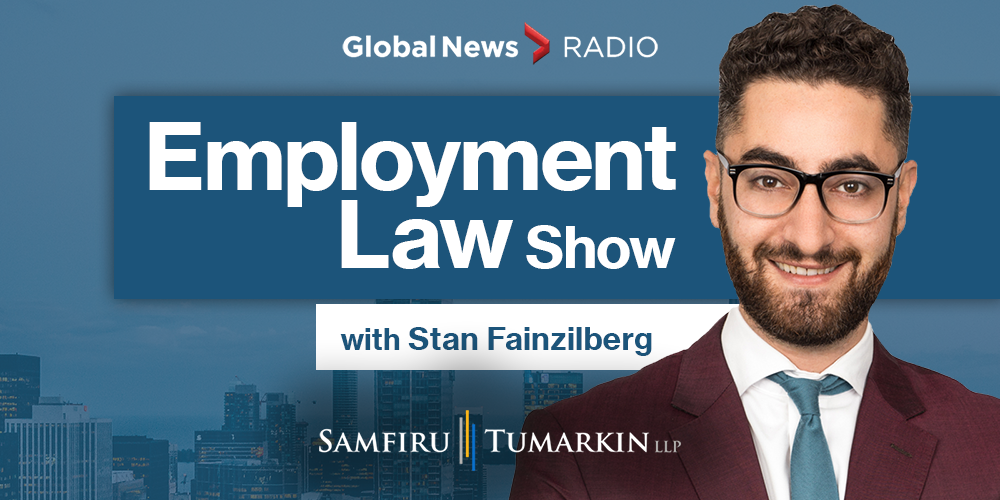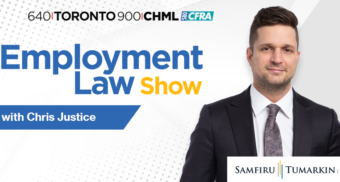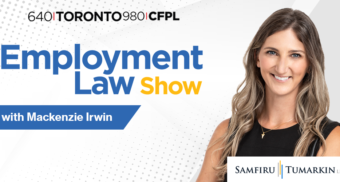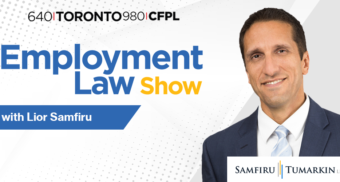Employment Law Show 640 Toronto – S9 E23

Episode Summary
The U.K Supreme court Uber decision, refusing vaccines, harassment in the workplace, and more on Season 9 Episode 23 of the Employment Law Show on Global News Radio 640 Toronto.
Listen below as Employment Lawyer and partner Stan Fainzilberg, Associate at Samfiru Tumarkin LLP, reveals your workplace rights in Toronto and the GTA on the Employment Law Show. Stan shatters myths and misconceptions about severance pay, terminations, workplace harassment, overtime pay, wrongful dismissal, constructive dismissal, duty to accommodate, independent contractors, and more.
Listen to the Episode
Episode Notes
The U.K Supreme Court ruled that Uber drivers will be classified as employees and not independent contractors.
This ruling has the potential to influence the class-action lawsuit launched by Samfiru Tumarkin LLP in Canada against Uber regarding the classification of Uber drivers.
I was hired on a one-year contract and after it expired I continued to work there for 5 years. Due to COVID-19, we were shut down eventually. What would my status have been?
Many individuals are misclassified as independent contractors when they are in fact employees. This is due to the nature of the relationship between the individual and their employer. If an individual works exclusively for an employer and does not determine their own hours and daily tasks, they are technically an employee. Independent contractors are not entitled to notice or severance.
I’ve worked as a server for over 16 years. The bar was closed due to COVID-19 and still hasn’t reopened. I can’t get in touch with the owner. What do I do?
A business that does eventually re-open has to contact their employees and pay their former employees severance despite a loss of business due to the pandemic. Employers who choose not to bring back employees are technically terminating employees.
I had an argument with my boss because he refuses to pay us during our lunch break. Is he allowed to do that?
In Ontario, employees are entitled to a 30-minute unpaid break period for every five hours they have worked. Employers are not obligated to pay employees for a lunch break. However, if a paid break was a precedent set earlier on and is now being changed, an Ontario employee can treat this as constructive dismissal.
My manager has made numerous inappropriate sexual comments. I told him to stop and informed HR but he’s the owner’s brother and they won’t do anything. What should I do?
Often in small companies, there often isn’t anyone to turn to when superiors are perpetuating inappropriate behaviour. In this situation, an employee should contact the Ministry of Labour and file a complaint. Employees can also treat the harassment as termination and constructive dismissal.
What is the most severance I can get if I’m terminated?
Severance pay is dependent on a number of factors, the most relevant being the age of an employee, the length of service as well as the position within a company.
My employer is trying to get me to sign a contract for the first time in twenty years. They’ve said if I don’t sign I will be fired. What should I do?
Employees in this situation do not have to sign a new contract. It is also important to note that unless an employee is being offered something tangible in return for signing the contract, such as an increase in pay, more benefits, etc, the contract is not enforceable.
My sister has experienced sexual harassment at her workplace and her employer keeps offering her incentives so she does not complain. What are her options?
If there have been repeated incidents of sexual harassment that are documented, an employee in this situation can choose to sue their employer. This could also be a constructive dismissal.
My son’s employer is shutting down and he’s been offered a chance to transfer. He doesn’t want to go to the other branch. If he rejects the offer, does he lose his rights to severance?
Significant changes and a new position have to be comparable to a previous situation for an employee. If the relocation offered to an employee has a major increase in commute and travel considerations, that can be potentially negative for an employee, they can choose to reject the offer and still be entitled to severance.
My job requires travel and there might eventually be a vaccine requirement to travel. If I refuse a vaccination, can my employer then let me go?
Employers in this situation can argue a frustration of contract with an employee and potentially let them go for termination with cause.
I work for a federally regulated carrier and am a truck driver. Do federal labour laws trump provincial labour laws?
If an employee is in a federally regulated position, federal labour laws apply and not provincial. If an employee has an incident, not within Canada but they work for a Canadian company, Canadian federal employment laws still apply.
I was laid off due to COVID-19 and I was recently recalled but I’d found more hours of employment elsewhere and can’t return at this time. Is this just cause to let me go?
This could be considered a resignation however the initial layoff was not technically legal and could have been treated as a termination.




